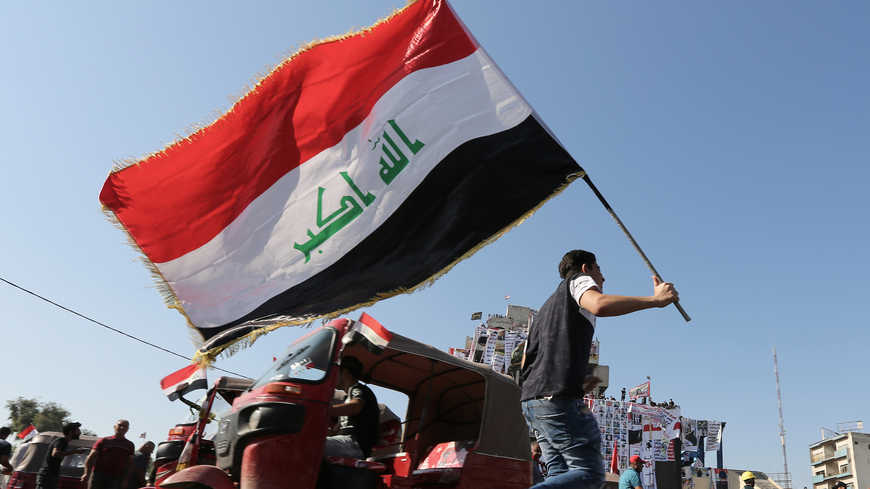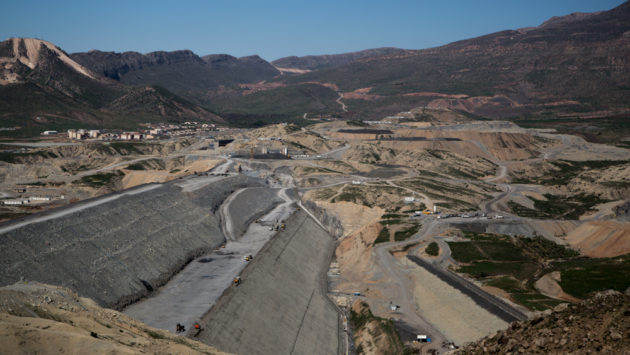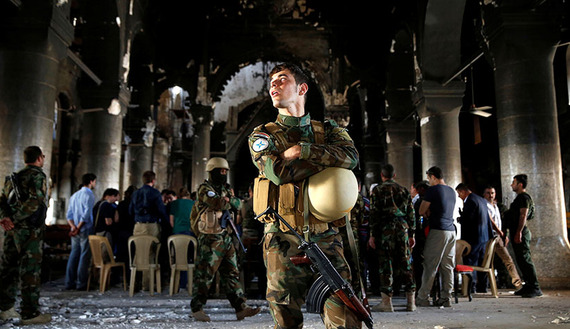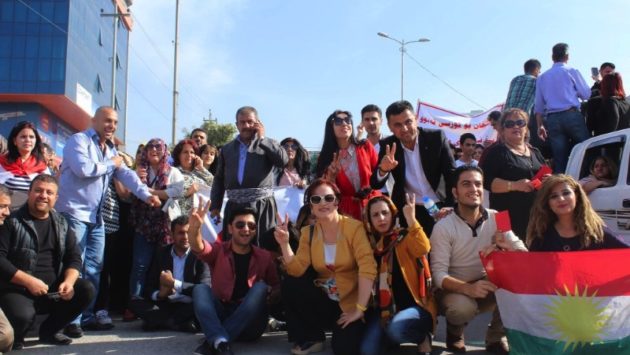Shiite Protesters Get Broad Backing Throughout Iraq
ِAl-Monitor – Saad Salloum
The crowd in Baghdad’s Mohammed al-Qasim Street on Oct. 31 was not caused solely by a street vendor selling Iraqi flags for 1,000 dinars (less than $1).
The street, the longest highway that wraps around the perimeter of Baghdad, had never seen so many flags flying from the windows of every passing car, in a show of great solidarity among Iraqis. The vendor smiled as he told Al-Monitor, “So far, I have sold more than 1,000 flags and it’s not even 2 p.m.”
Zooming out from a focus on Mohammed al-Qasim shows the scene is surreal across the country, as tens of thousands of Iraqis protest corruption and Iranian influence, seeking a new government. The demonstrations, started by Shiite Muslims, have energized the Iraqi street across all sects and ethnicities.
For example, the Sabian Mandaean Council in Maysan, southern Iraq, announced it was canceling all celebrations of the Nov. 2 Eid Dahwa Hininah (Prosperity Feast), and said only religious rituals would be observed, to show respect for protesters who have been shot by security forces in Baghdad and other provinces.
The head of the Mandaean (Gnostic) community in Maysan told Al-Monitor the people there marched in support of protesters’ demands and distributed food to other demonstrators.
In a related development, Chaldean Catholic Church Patriarch of Babylon Louis Raphael I Sako canceled a scheduled Oct. 30 visit to Hungary to meet with Russian President Vladimir Putin and the prime minister of Hungary, preferring to stay in Baghdad during this “difficult” time, as he put it.
Sako told Al-Monitor that he and other bishops on Oct. 28 visited the wounded protesters at al-Kindi hospital in Baghdad and provided funds to buy medicine for the injured.
Sako also called on the heads of Christian communities and their representatives on Oct. 29 to hold a meeting at the headquarters of the Chaldean Patriarchate in Baghdad with regard to the ongoing protests. At the end of the meeting, a statement was issued confirming the need to stand by the protesters and support their demands. The statement thanked “the young men and women, who are the future of Iraq, for their peaceful protests and for breaking the sectarian barriers in the country, and emphasizing the Iraqi national identity.”
It added, “Those young people have been calling for Iraq as a homeland for all, based on civil society and respect for pluralism.” The statement called on the government to assume its responsibility to protect the lives of protesters and their right to express their opinions peacefully.
The protests began peacefully, but the government did not respond in kind. Reuters reported that between Oct. 1 and Oct. 29, at least 250 people had been killed and thousands wounded.
Christian activists from the Ninevah Plain also launched a campaign of solidarity with the protesters Oct. 27. They issued a statement saying, “We … stand in solidarity with our fellow demonstrators. We apologize for not going to the streets, as holding protests is not allowed in our cities.” Activists started a hashtag that, translated, means “I’m protesting for my rights.”
Civil activist Rand Khaled Sobeih told Al-Monitor the initiative aspires to establish other activities, including a campaign to support the wounded and people in need. She said this is a stepping stone to encourage all Iraqi Christians to show solidarity with the protests. “The message we are sending is that we as Christians are with you. We are all one people who love life,” Sobeih said.
In Mosul, Sunni activists who had been controlled by the Islamic State (IS) for years have also expressed support for the protests through social media, despite being summoned by influential security officials who required them to pledge in writing that they would not support the protesters, according to the accounts of many who spoke with Al-Monitor.
“The majority of the people showing solidarity with the protesters are young people of both sexes — civil activists who were not drawn by the [Iran-backed, Islamic] political parties or the armed forces that tried to win them over after the liberation of Mosul from IS,” Layla Salih, an activist from Mosul, told Al-Monitor.
“We have so much in common with the protesters in Baghdad and the southern provinces. They have been calling against government corruption and the control of political parties that are protecting their corrupt militias funding them,” Salih said.
She added that some activists have been summoned by security authorities and found themselves forced to leave the city for protection, while others joined the protests in Baghdad and other provinces.
Among Kurds, there was official silence and shy support by some journalists, activists and parliament members from within the opposition parties of the ruling party in Erbil.
They issued a statement signed by more than 100 activists saying that the popular protests are a sincere and courageous expression against abuse of power. The statement called the protesters “courageous people who rose in the face of the bad management of the country at the hands of a group of corrupt parties and the armed militias and mafias controlling all political, economic and security [aspects of] life.”
The statement added that the state has become divided along sectarian and familial lines — a jab at the powerful families in the Kurdistan region, such as the Barzanis, Talibanis and others. “The future of the country has been linked to the interests and power of corrupt political and economic elites. The country’s potential and sovereignty have been bent to serve regional and foreign agendas, which is another reason for the popular uprising and the anger in the streets.”
Kurdish activists and speakers said Kurds are officially silent for fear of losing the political gains they’ve made since 2003, when Saddam Hussein and his repressive Sunni regime were ousted. These Kurds are especially concerned about jeopardizing the improved relations between the Kurdistan region and the central government under Iraqi Prime Minister Adel Abdul Mahdi — even though Abdul Mahdi is under fire for failing to improve living conditions and banish corruption. Protesters are demanding his resignation.




